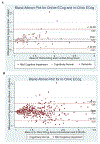Validity of Online Versus In-Clinic Self-Reported Everyday Cognition Scale
- PMID: 35543000
- PMCID: PMC9881822
- DOI: 10.14283/jpad.2022.20
Validity of Online Versus In-Clinic Self-Reported Everyday Cognition Scale
Abstract
Background: Online cognitive assessments are alternatives to in-clinic assessments.
Objectives: We evaluated the relationship between online and in-clinic self-reported Everyday Cognition Scale (ECog).
Methods: In 94 Alzheimer's Disease Neuroimaging Initiative and Brain Health Registry (ADNI-BHR) participants, we estimated associations between online and in-clinic Everyday Cognition using Bland-Altman plots and regression. In 472 ADNI participants, we estimated reliability of in-clinic Everyday Cognition completed six months apart using Bland-Altman plots and regression.
Results: Online Everyday Cognition associations: Mean difference was 0.11 (95% limits of agreement: -0.41 to 0.64). In-clinic Everyday Cognition score increased by 0.81 for each online Everyday Cognition score unit increase (R2=0.60). In-clinic Everyday Cognition reliability: Mean difference was 0.01 (95% limits of agreement: -0.61 to 0.62). In-clinic Everyday Cognition score at enrollment increased by 0.79 for each in-clinic Everyday Cognition score unit increase at six months (R2=0.61).
Conclusion: Online Everyday Cognition closely corresponded with in-clinic Everyday Cognition, supporting validity of using online cognitive assessments to more efficiently facilitate Alzheimer's disease research.
Keywords: online research registry; Everyday cognition.
Conflict of interest statement
Taylor Howell has nothing to disclose. John Neuhaus reports grants from the National Institutes of Health (NIH). M. Maria Glymour reports grants from the National Institutes of Health (NIH) and the Robert Wood Johnson Foundation. Michael W Weiner reports grants from the National Institutes of Health (NIH) (5U19AG024904-14; 1R01AG053798-01A1; R01 MH098062; U24 AG057437-01; 1U2CA060426-01; 1R01AG058676-01A1; and 1RF1AG059009-01) and the Department of Defense (DOD) (W81XWH-15-2-0070; 0W81XWH-12-2-0012; W81XWH-14-1-0462; and W81XWH-13-1-0259); served on advisory boards for Alzheon, Inc., Biogen, Cerecin, Dolby Family Ventures, Eli Lilly, Merck Sharp and Dohme Corp., Nestle/Nestec, and Roche, University of Southern California (USC); provided consulting to Baird Equity Capital, BioClinica, Cerecin, Inc., Cytox, Dolby Family Ventures, Duke University, FUJIFILM-Toyama Chemical (Japan), Garfield Weston, Genentech, Guidepoint Global, Indiana University, Japanese Organization for Medical Device Development, Inc. (JOMDD), Nestle/Nestec, NIH, Peerview Internal Medicine, Roche, T3D Therapeutics, University of Southern California (USC), and Vida Ventures; acted as a lecturer for The Buck Institute for Research on Aging; received funding for academic travel from USC; holds stock options with Alzeca, Alzheon Inc., and Anven; reports research support from the Patient-Centered Outcomes Research Institute (PCORI) (PPRN-1501-26817), California Department of Public Health (CDPH) (16-10054), University of Michigan (18-PAF01312), Siemens (444951-54249), Biogen (174552), Hillblom Foundation (2015-A-011-NET), Alzheimer’s Association (BHR-16-459161), the State of California (18-109929), Johnson and Johnson, Kevin and Connie Shanahan, General Electric (GE), VU Medical Center, Australian Catholic University (HBI-BHR), The Stroke Foundation, and the Veterans Administration. Rachel L Nosheny reports grants from the National Institutes of Health (NIH), Alzheimer’s Association, California Department of Public Health, and Genentech, Inc.
Figures



References
-
- Farias ST, Cahn-Weiner DA, Harvey DJ, Reed BR, Mungas D, Kramer JH, et al. Longitudinal Changes in Memory and Executive Functioning are Associated with Longitudinal Change in Instrumental Activities of Daily Living in older adults. Clin Neuropsychol 2009;23:446–61. 10.1080/13854040802360558. - DOI - PMC - PubMed
